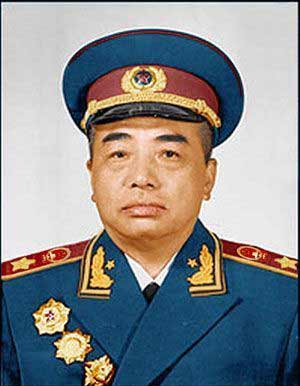More languages
More actions
(Categorize Peng as a soldierl; I added birth place and name; and add the dates he served in the defense ministry.) |
m (Headings) Tag: Visual edit |
||
| (One intermediate revision by one other user not shown) | |||
| Line 10: | Line 10: | ||
}} | }} | ||
'''Peng Dehuai''' was a military leader who served in the [[Chinese Workers' and Peasants' Red Army]] and [[People's Liberation Army]], and commanded the [[People's Volunteer Army]]. | '''Peng Dehuai''' (1898 October 24 – 1974 November 29; formerly named Duhua)<ref>{{Web citation|newspaper=Chinese Government Portal|title=Peng Dehuai|date=2007-11-16|url=http://www.gov.cn/test/2007-11/16/content_807448.htm|archive-url=https://web.archive.org/web/20230310042343/http://www.gov.cn/test/2007-11/16/content_807448.htm|archive-date=2023-03-10|retrieved=2023-03-18}}</ref> was a military leader who served in the [[Chinese Workers' and Peasants' Red Army]] and [[People's Liberation Army]], and commanded the [[People's Volunteer Army]]. | ||
Peng served as the [[Ministry of National Defense of the People's Republic of China|defense minister]] of the [[People's Republic of China|PRC]] between 1954 and 1959.{{Citation needed}} | Peng served as the [[Ministry of National Defense of the People's Republic of China|defense minister]] of the [[People's Republic of China|PRC]] between 1954 and 1959.{{Citation needed}} | ||
= | == Early Life == | ||
Peng Dehuai was born on October 24, 1898, in Xiangtan County of [[Hunan Province]]. He was a rough-hewn man of very humble beginnings. He had previously worked in coal mines and on lake dams. Due to his living conditions and the progressive influence of the [[Xinhai Revolution|1911 revolution]], he joined the Hunan warlords in 1916 and gradually rose through the ranks to become a senior officer. He later became a member of the [[Communist Party of China]], affirming his path of life devoted to [[revolution]].<ref>{{Web citation|newspaper=China.org.cn|title=1898: Marshal Peng Dehuai was born|date=2012-10-24|url=http://www.china.org.cn/china/18th_cpc_congress/2012-10/24/content_26890462.htm|archive-url=https://web.archive.org/web/20121124075606/http://www.china.org.cn/china/18th_cpc_congress/2012-10/24/content_26890462.htm|archive-date=2012-11-24|retrieved=2023-03-18}}</ref> | |||
== | == Wars == | ||
On October 5, Peng was named the Commander and the [[Commissar of the People's Volunteer Army]] and held both titles until the Korean Armistice Agreement in 1953. | === Korean War === | ||
On October 5, Peng was named the Commander and the [[Commissar of the People's Volunteer Army]] and held both titles until the [[Korean Armistice Agreement]] in 1953. | |||
== References == | |||
[[Category:Military Commanders]] | [[Category:Military Commanders]] | ||
[[Category:Soldiers]] | [[Category:Soldiers]] | ||
[[Category:Communists]] | |||
Latest revision as of 17:58, 18 March 2023
Peng Dehuai 彭德怀 | |
|---|---|
 | |
| Born | 彭清宗 (Péng Qīngzōng) October 24, 1898 Shixiang, Xiangtan County, Hunan, Qing Empire |
| Died | November 29, 1974 (aged 76) Beijing, People's Republic of China |
Peng Dehuai (1898 October 24 – 1974 November 29; formerly named Duhua)[1] was a military leader who served in the Chinese Workers' and Peasants' Red Army and People's Liberation Army, and commanded the People's Volunteer Army.
Peng served as the defense minister of the PRC between 1954 and 1959.[citation needed]
Early Life[edit | edit source]
Peng Dehuai was born on October 24, 1898, in Xiangtan County of Hunan Province. He was a rough-hewn man of very humble beginnings. He had previously worked in coal mines and on lake dams. Due to his living conditions and the progressive influence of the 1911 revolution, he joined the Hunan warlords in 1916 and gradually rose through the ranks to become a senior officer. He later became a member of the Communist Party of China, affirming his path of life devoted to revolution.[2]
Wars[edit | edit source]
Korean War[edit | edit source]
On October 5, Peng was named the Commander and the Commissar of the People's Volunteer Army and held both titles until the Korean Armistice Agreement in 1953.
References[edit | edit source]
- ↑ "Peng Dehuai" (2007-11-16). Chinese Government Portal. Archived from the original on 2023-03-10. Retrieved 2023-03-18.
- ↑ "1898: Marshal Peng Dehuai was born" (2012-10-24). China.org.cn. Archived from the original on 2012-11-24. Retrieved 2023-03-18.
